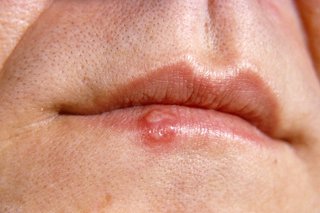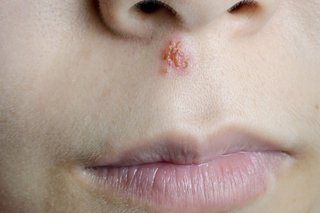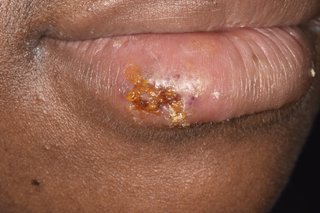Cold sores are tiny, fluid-filled blisters on the face (or for adults also on the genitals) that are caused by the herpes simplex virus.
The virus is very common and cold sores usually heal without treatment within 10 days. They do not leave a scar.
Most people are exposed to the cold sores virus when they are young after close contact with someone who has a cold sore.
The cold sore virus is spread by direct skin-to-skin contact and is highly infectious. Be careful not to spread cold sores, particularly around babies and children. It can be fatal to newborn babies.
Check if it’s a cold sore
Small, fluid-filled blisters are the main symptom of cold sores in adults and children.
Dangers to children and babies
Cold sores can be fatal to newborn babies and dangerous for older babies or children.
Do not kiss babies if you have a cold sore. It can lead to neonatal herpes.
In rare situations, cold sores can cause complications for older babies and children. The most serious of these is encephalitis, when the virus causes an inflammation of the brain.
Emergency action required: Call 999 or 112 if your baby or child has a cold sore and has:
- confusion
- difficulty speaking
- difficulty waking up or being very drowsy
- changes in behaviour – such as being very irritable
- becoming floppy and unresponsive
- difficulty breathing, breathing fast or making grunting noises
- blue tongue and skin (cyanosis)
- seizure (fit)
These are symptoms of encephalitis.
Caring for your baby if you have a cold sore
If you think you have or are about to develop a cold sore:
- do not kiss your baby
- wash your hands before contact with your baby
- cover up cold sores before breastfeeding to avoid transferring the virus by touching your mouth and then your breast
Non-urgent advice: Contact your GP if:
- you or your child’s cold sore has not started to heal within 10 days
- you're worried about a cold sore or think it's something else
- the cold sore is very large or painful
- your child gets a cold sore on their eyelid or around their eyes
- you or your child has swollen, painful gums and sores in the mouth (gingivostomatitis)
- you're pregnant – there's an increased risk of neonatal herpes
- you have a weakened immune system – for example, because of chemotherapy or diabetes
- you or your child’s cold sores keep coming back
Symptoms
Adult symptoms
Cold sores usually start with a tingling, itching or burning feeling.
Over the next 48 hours, the blisters may appear, weep and usually crust over into a scab.
Child symptoms
Your child may have clusters of blisters inside the mouth, on the tongue and outside the mouth.
Cold sores can spread to your child’s fingers if your child sucks their fingers. They can also spread to the eyes if your child touches an open sore and then rubs their eyes.
Your child might also have any of the following symptoms:
- sore gums, sore throat and swollen glands
- more saliva than normal
- high temperature
- headaches
- refusal to drink fluids
Get help from your pharmacist or GP
Your pharmacist can help with cold sores by recommending:
- creams to ease pain and irritation
- antiviral creams to speed up healing time
- cold sore patches to protect the skin while it heals
Use antiviral creams as soon as you feel a cold sore coming on. They do not always work after blisters appear.
Your GP might prescribe antiviral tablets if the cold sores are very large, painful or keep coming back.
Treating cold sores at home
There are things you can do at home to treat cold sores and avoid spreading the virus:
Do
-
drink lots of fluids (such as water or milk)
-
eat cool, soft foods
-
avoid salty foods or citrus foods (these can make blisters sting)
-
wash your hands often with soap and warm water
-
wash your child’s clothes separately if they have a cold sore
Don't
-
do not touch cold sores – except when you put on cold sore creams
-
do not share anything that comes into contact with cold sores – such as cold sore creams, cutlery and towels
-
do not kiss anyone if you have a cold sore
-
do not let people with a cold sore kiss your baby or child
-
do not have oral sex until the cold sore is completely healed
Childcare, school and contact play
Your child can usually continue going to childcare and school if they have a cold sore and they are well enough to attend.
Children with cold sores should avoid playing with other children until:
- their cold sores have completely healed
- any related symptoms have stopped (for example, fever)



